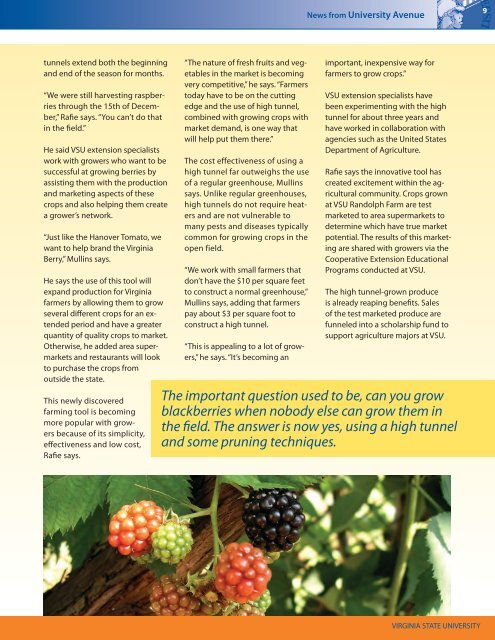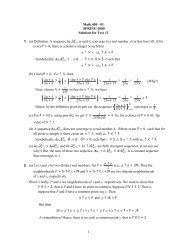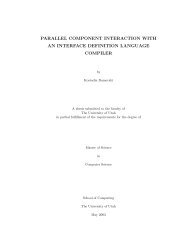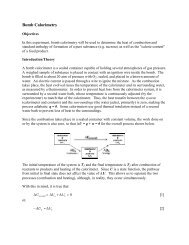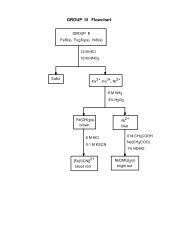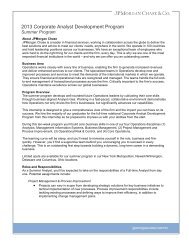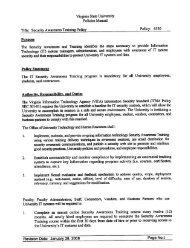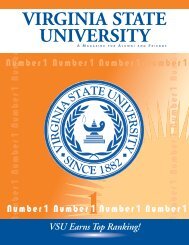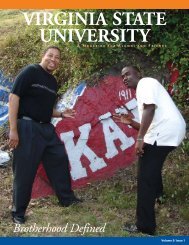development news - Virginia State University
development news - Virginia State University
development news - Virginia State University
Create successful ePaper yourself
Turn your PDF publications into a flip-book with our unique Google optimized e-Paper software.
tunnels extend both the beginning<br />
and end of the season for months.<br />
“We were still harvesting raspberries<br />
through the 15th of December,”<br />
Rafie says. “You can’t do that<br />
in the field.”<br />
He said VSU extension specialists<br />
work with growers who want to be<br />
successful at growing berries by<br />
assisting them with the production<br />
and marketing aspects of these<br />
crops and also helping them create<br />
a grower’s network.<br />
“Just like the Hanover Tomato, we<br />
want to help brand the <strong>Virginia</strong><br />
Berry,” Mullins says.<br />
He says the use of this tool will<br />
expand production for <strong>Virginia</strong><br />
farmers by allowing them to grow<br />
several different crops for an extended<br />
period and have a greater<br />
quantity of quality crops to market.<br />
Otherwise, he added area supermarkets<br />
and restaurants will look<br />
to purchase the crops from<br />
outside the state.<br />
This newly discovered<br />
farming tool is becoming<br />
more popular with growers<br />
because of its simplicity,<br />
effectiveness and low cost,<br />
Rafie says.<br />
“The nature of fresh fruits and vegetables<br />
in the market is becoming<br />
very competitive,” he says. “Farmers<br />
today have to be on the cutting<br />
edge and the use of high tunnel,<br />
combined with growing crops with<br />
market demand, is one way that<br />
will help put them there.”<br />
The cost effectiveness of using a<br />
high tunnel far outweighs the use<br />
of a regular greenhouse, Mullins<br />
says. Unlike regular greenhouses,<br />
high tunnels do not require heaters<br />
and are not vulnerable to<br />
many pests and diseases typically<br />
common for growing crops in the<br />
open field.<br />
“We work with small farmers that<br />
don’t have the $10 per square feet<br />
to construct a normal greenhouse,”<br />
Mullins says, adding that farmers<br />
pay about $3 per square foot to<br />
construct a high tunnel.<br />
“This is appealing to a lot of growers,”<br />
he says. “It’s becoming an<br />
News from <strong>University</strong> Avenue<br />
important, inexpensive way for<br />
farmers to grow crops.”<br />
VSU extension specialists have<br />
been experimenting with the high<br />
tunnel for about three years and<br />
have worked in collaboration with<br />
agencies such as the United <strong>State</strong>s<br />
Department of Agriculture.<br />
Rafie says the innovative tool has<br />
created excitement within the agricultural<br />
community. Crops grown<br />
at VSU Randolph Farm are test<br />
marketed to area supermarkets to<br />
determine which have true market<br />
potential. The results of this marketing<br />
are shared with growers via the<br />
Cooperative Extension Educational<br />
Programs conducted at VSU.<br />
The high tunnel-grown produce<br />
is already reaping benefits. Sales<br />
of the test marketed produce are<br />
funneled into a scholarship fund to<br />
support agriculture majors at VSU.<br />
The important question used to be, can you grow<br />
blackberries when nobody else can grow them in<br />
the field. The answer is now yes, using a high tunnel<br />
and some pruning techniques.<br />
VIRGINIA STATE UNIVERSITY<br />
9


